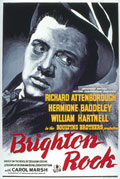
Directed by
John Boulting
92 minutes
Rated PG
Reviewed by
Bernard Hemingway

Brighton Rock (1947)
Stylistically influenced by American gangster films of the 1930s and '40s, most evidently in the striking Expressionist cinematography by Harry Waxman (I kept thinking of The Petrified Forest, 1936), Brighton Rock is in terms of plot mechanics a rudimentary but effective adaptation of Graham Greene's 1938 novel about small-time warring criminal gangs in the days when, as the opening titles tell us, Brighton was the crime capital of England. The novel wallows in a bitter pessimism embodied in the form of Pinkie Brown, played here by Richard Attenborough, a vicious little punk who takes over a protection racket after its leader is killed and whose delusions of being a big time gangster lead him further and further into a spiral of deception, murder and moral nihilism..
Attenborough, although at 24 too old to be playing a 17 year-old (he had played the character in a 1942 stage version also written by Greene), does an excellent job as Pinkie although for my money Dirk Bogarde, who was also starting his film career around the same time would have been better suited to the part (compare his petty hoodlum, Tom Riley, in The Blue Lamp, 1950).
What the film does get right is the grubby seediness of Greene’s settings and the lower class commonness of the milieu. From the crummy lodgings and Victorian era public bars to Hermione Baddeley’s brassy good-time girl, Ida Arnold, and Pinkie’s trio of gang members (including Willam Hartnell, who would become the first Doctor Who) to his broken-down Dickensian lawyer (Harcourt Williams) they are all telling translations of the original text.
Less effectively done is the relationship between Pinkie and Rose (Carol Marsh) the naïve teenage waitress who happens to cross his path and is swept off her feet by his intensity, With a running time of 92 minutes perhaps there simply wasn’t the time to allow the relationship to develop and make her attachment to Pinkie palpable but Attenborough’s thoroughly unsympathetic Pinkie lacks any quality that would explain her instantaneous puppy-like devotion to him. Greene who scripted the film after he rejected a version by Terence Rattigan, softened the original ending in his novel, leaving Rose in a state of loving delusion about Pinkie’s true nature. It is, however,some small measure of relief in an unrelentingly grim story.
FYI: An unusually goof 2010 remake shifted the largely intact story to the 1960s
Want something different?





